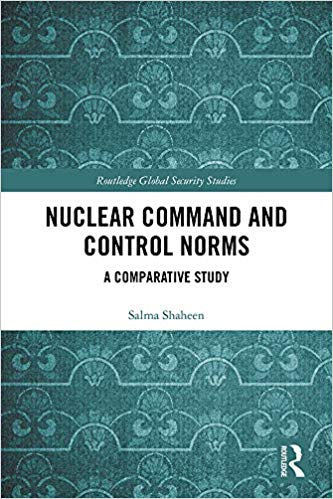This book offers a new analytical framework for studying nuclear command and control (C2), based on a comparative study of four nuclear weapons states (NWS).
The subject of nuclear operations management has long been shrouded in secrecy, and whilst the importance of nuclear C2 cannot be disputed, there are few academic studies into how and why states develop these systems. This volume includes a comparative study of the development of nuclear C2 by four different NWS (Britain, China, India, and Pakistan) and demonstrates that, despite several differences, there is a central set of factors that remain constant. The analytical framework used in this study identifies key factors that can potentially shape the evolution and stability of nuclear C2. These factors include geostrategic (threat) environment, international norms, leadership, and control of nuclear operations (civil-military control). The book also analyses the interaction among different stakeholders within the nuclear C2 enterprise. It recognises that politicians, the military and scientists all have key but different roles to play, and the way these stakeholders have learned to co-exist with each other is explored. This volume offers a set of dynamics that could form a global norm for nuclear C2, serving as a standard for new entrants into the nuclear club.
This book will be of much interest to students of nuclear proliferation, global governance, and International Relations in general.
چکیده فارسی
این کتاب چارچوب تحلیلی جدیدی را برای مطالعه فرماندهی و کنترل هستهای (C2)، بر اساس مطالعه مقایسهای چهار کشور دارای سلاح هستهای (NWS) ارائه میکند.
موضوع مدیریت عملیات هستهای مدتهاست که محرمانه بوده است، و در حالی که اهمیت C2 هستهای قابل بحث نیست، مطالعات آکادمیک کمی در مورد چگونگی و چرایی توسعه این سیستمها توسط دولتها وجود دارد. این جلد شامل یک مطالعه مقایسه ای از توسعه C2 هسته ای توسط چهار NWS مختلف (بریتانیا، چین، هند و پاکستان) است و نشان می دهد که، علی رغم چندین تفاوت، مجموعه ای مرکزی از عوامل وجود دارد که ثابت می مانند. چارچوب تحلیلی مورد استفاده در این مطالعه عوامل کلیدی را شناسایی می کند که به طور بالقوه می توانند تکامل و پایداری C2 هسته ای را شکل دهند. این عوامل شامل محیط ژئواستراتژیک (تهدید)، هنجارهای بین المللی، رهبری و کنترل عملیات هسته ای (کنترل غیرنظامی-نظامی) است. این کتاب همچنین تعامل بین سهامداران مختلف در شرکت هسته ای C2 را تجزیه و تحلیل می کند. تشخیص میدهد که سیاستمداران، ارتش و دانشمندان، همه نقشهای کلیدی اما متفاوتی برای ایفا کردن دارند، و روشی که این سهامداران یاد گرفتهاند تا با یکدیگر همزیستی کنند، مورد بررسی قرار میگیرد. این جلد مجموعهای از پویاییها را ارائه میکند که میتواند یک استاندارد جهانی برای C2 هستهای را تشکیل دهد و به عنوان استانداردی برای افراد جدید وارد باشگاه هستهای عمل کند.
این کتاب برای دانشجویانی که در زمینه اشاعه تسلیحات هسته ای، حکمرانی جهانی و به طور کلی روابط بین الملل فعالیت می کنند بسیار مورد توجه خواهد بود.
ادامه ...
بستن ...
Ebook details:
عنوان: Nuclear Command and Control Norms A Comparative Study (Routledge Global Security Studies) (9781138349292)
نویسنده: Salma Shaheen
ناشر: Routledge; 1 edition (October 1, 2018)
زبان: English
شابک: 1138349291, 978-1138349292
حجم: 3 Mb
فرمت: True Pdf
ادامه ...
بستن ...










